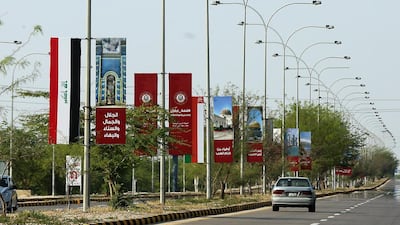The 28th Arab League Summit, in Amman on Wednesday, is an opportunity for leaders in this region to discuss current developments and relations among its 22 member states. On the agenda this year is the fight against terrorism and the situation in Syria and Libya.
Writing in the London-based pan-Arab daily paper Al Arab, the columnist Dr Khattar Abu Diab said that it will not be enough to make resounding announcements to change the common Arab perspective that league members appear to be in accord but are in fact political divided.
“The multitude of resolutions contrasts with the modicum of implementation and palpable projects,” Dr Adu Diab wrote of previous summits.
“Translating words into deeds requires seriousness, rationality and optimism as well as the prevalence of the political reality to maintain the remaining strengths and build on them.”
The writer did not expect any highlights at the 28th Arab League Summit.
“Should there be an awakening brought on by the summit’s symbolic venue and the magnitude of the challenges it faces, then perhaps it will answer some vital questions about the future of the Arab system in light of its marginalisation and the squabble over it between Iran, Turkey and Israel.”
In such a scenario, the summit “would also discuss ways to deal with the American and Russian presidents to prevent the creation of a new Middle East that overlooks Arab interests or the conclusion of a new Sykes-Picot agreement ... with the exploitation of the Kurdish issue and the division of the zones of influence in Syria and Iraq”, he said.
According to the writer, no amount of effort or good faith could lead to any achievement or breakthrough in the absence of dynamism, polarising power and a favourable regional or international climate.
Worse, he added, the dissension and conflicts could go on and there would be no will to salvage the situation.
“This is not due to a lack of diagnosis or to the ignorance of the magnitude of the tasks lying ahead. Rather, the multitude of crises shifts the focus of each state to its direct surroundings and makes them lose all sense of national security and common interests,” he said.
Dr Abu Diab saw no established axis of regional stability.
But the writer concluded that the Jordanian Arab Summit might prove to be a positive starting point if all participants share some sense of responsibility.
According to Arabic-language commentator Samir Atallah, Arabs should look for ways to develop the Arab League instead of criticising its inefficiency.
"The Arab League should become an entity that transcends the discords of its members and their struggle for power to a constant performance at state-level," Atallah wrote in the London-based pan-Arab daily paper Asharq Al Awsat.
“As such, the identity of its headquarters would expand without changing, and the vitality of its general secretariat would no longer be associated with the person of its secretary-general.”
The writer noted that the league has always had the same organisational humdrum: Egyptian ambassador becomes minister of foreign affairs and then assumes the post of secretary-general in a Tahrir Square building; an administrative office prepares the conferences and formulates the resolutions while making sure not to hit any old wall or new pillar.
However, he argued, the Arab League cannot give more than what it is offered.
“The league should be vested with a more important, if not efficient, role. It should have a board of directors, a council of elders or an advisory panel,” he concluded.
*Translated by Jennifer Attieh
translation@thenational.ae

